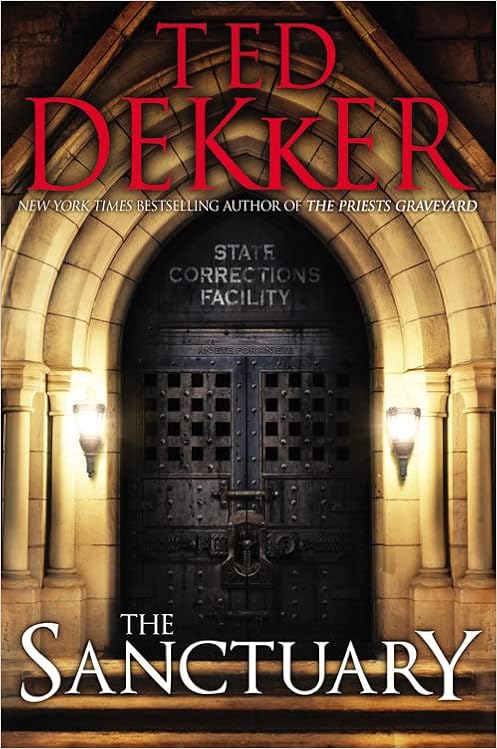
Description
"[Heaven's Wager] is genuinely exciting...fast-paced...spine-tingling..." -- Publishers Weekly Excerpt. © Reprinted by permission. All rights reserved. Chapter One Present Day An overhead fan swished through the afternoon heat above Padre Francis Cadione's head, squeaking once every rotation, but otherwise not a sound disturbed the silence in the small, dimly lit room. A strong smell of lemon oil mixed with pipe smoke lingered in the air. The windows on either side of the ancient desk reached tall and narrow to the ceiling and cast an amber light across the oak floor. Some described the furnishings as gothic. Cadione preferred to think of his office as merely atmospheric. Which was fitting. He was a man of the church, and the church was all about atmosphere. But the visitor sitting with folded hands in the burgundy guest chair had brought his own atmosphere with him. It spread like an aura of heavy perfume that dispensed with the nostrils and made straight for the spine. The man had been sitting there for less than a minute now, smiling like a banshee as though he alone knew some great secret, and already Padre Cadione felt oddly out of balance. One of the visitor's legs swung over the other like a hypnotizing pendulum. His blue eyes held their gaze on the priest's, refusing to release the connection. The padre shifted his eyes, reached for his black pipe, and clicked its stem gently along his teeth. The small gesture of habit brought a familiar easiness. A thin tendril of tobacco smoke rose lazily past his bushy eyebrows before meeting wafts of fan-air and then scattering. He crossed his legs and realized the moment he had done so that he'd inadvertently matched the visitor's posture. Relax, Francis. You're seeing things now. He's just a man sitting there. A man not as easily impressed as others, perhaps, but a mere man nonetheless. "So then, my friend. You seem to be in good spirits." "Good spirits? And what do you mean by good spirits, Padre?" The man's gentle voice seemed to carry that strange aura with it-the one that had tingled the padre's spine. It was as though their roles had become confused. Spun around by that old ceiling fan whacking away up there. Padre Cadione drew at the pipe and released the smoke through his lips. He spoke through the haze. Atmosphere. It was all about atmosphere. "I only meant you seem to be pretty happy with life, despite your . . . adversity. Nothing more." "Adversity?" The man's left brow arched. The smile below his blue eyes broadened slightly. "Adversity is a relative term, isn't it? It seems to me that if someone is happy, as you say, his circumstances cannot be adequately described as adverse. No?" Cadione wasn't sure if the man actually wanted an answer. The question felt more like a reprimand-as if this man had risen above mere happiness and now schooled those foolish mortals who still struggled with the simple pursuit of it. "But you are right. I am in very good spirits," the man said. Cadione cleared his throat and smiled. "Yes, I can see that." Thing of it was, this man was not just happy. He literally seemed thrilled with whatever had gotten under his skin. Not drugs-surely not. The visitor sat there cross-legged, staring at him with those deep blue eyes, wearing an inviting smile. Daring him, it seemed. Come on, Padre, do your thing. Tell me about God. Tell me about goodness and happiness and about how nothing really matters but knowing God. Tell me, tell me, tell me, baby. Tell me. The priest felt a small, nervous grin cross his face. That was the other thing about this man's brand of happiness. It seemed infectious, if a tad presumptuous. Either way, the man was waiting, and Cadione could not just sit there forever contemplating matters. He owed this man something. He was, after all, a man of God, employed to shed light. Or at least to point the way to the light switch. "Being certain of one's place in life does indeed bring one happiness," Cadione said. "I knew you could understand, Padre! You have no idea how good it is to speak to someone who really understands. Sometimes I feel like I'm ready to burst and no one around me understands. You do understand, don't you?" "Yes." Cadione nodded instinctively, grinning, still surprised by the man's passion. "Exactly! People like you and I may have all the wealth in the world, but it's this other thing that is really the magic of life." "Yes." "Nothing compares. Nothing at all. Am I right?" "Yes." A small chuckle escaped Cadione's lips. Goodness, he was starting to feel as though he were being led into a trap with this long string of yeses. There could be no doubting the man's sincerity. Or his passion, for that matter. On the other hand, the man might very well have lost his reason. Become eccentric, even senile. Cadione had seen it happen to plenty of people in the man's social strata. The visitor leaned forward with a sparkle in his eyes. He spoke in a hushed voice now. "Have you ever seen it, Padre?" "Seen what?" He knew he sounded far too much like a young boy sitting wide eyed at the instruction of a wise father, but Cadione was powerless to stop himself. "The great reality behind all things." The man lifted his eyes past Cadione to a painting of God's hand reaching out to a man's on the wall behind. "The hand of God." He nodded at the painting, and the priest twisted in his seat. "God's hand? Yes, I see it every day. Everywhere I look." "Yes, of course. But I mean really see, Padre? Have you actually seen him do things? Not something you believe he might have done. Like, Lookie there, I do believe God has opened up a parking spot near the door for us, Honey. But have you really seen God do something before your eyes?" The man's exuberance reignited the tingle in Cadione's spine. If the man had lost his sensibilities, perhaps he had found something better. Of course, even if God did have his fingers down here on Earth stirring the pot, people couldn't just open their eyes and see it. He pictured a large thumb and forefinger picking up a car and moving it to allow a van easy parking. "Actually, I can't say that I have." "Well, I know someone who has. I know someone who does." A silence settled. The visitor stared at him with those piercing baby blues. But the eyes were not the eyes of a madman. Padre Cadione drew on the pipe, but it had lost its fire and he was rewarded with nothing but stale air. "You do, huh?" "I do." The man leaned back again, smiling softly. "And I have seen. Would you like to see, Padre?" There was a magic in the man's words. A mystery that spoke of truth. He swallowed and leaned back, once again matching the visitor's posture. It occurred to him that he had not actually responded to the man's question. "It might change your world," the man said. "Yes. I'm sorry, I was . . . uh . . ." "Well then." The man drew a deep breath and crossed his legs once again. "Open your mind, my friend. Wide open. Can you do that?" "Yes . . . Yes, I suppose." "Good. I have a story for you." The visitor took another deep breath, thoroughly satisfied with himself, it seemed, and he began.
Features & Highlights
- The sudden death of his wife and son is bad enough, but when the company he works for steals his idea, Kent Anthony begins to consider a plan for revenge, unless his faithful mother-in-law can stop him. Original.



